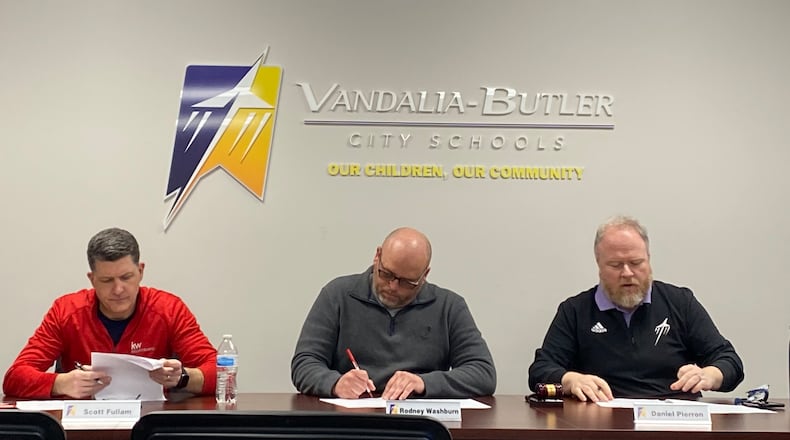The earned income tax measure would affect wages and self-employment income, but would not tax several other categories of income. Property tax levies are more common in Dayton-area schools, but a number of school districts, including Xenia, Fairborn, Troy and Piqua, do levy income taxes as well.
Vandalia Superintendent Rob O’Leary and Treasurer Eric Beavers say the earned income tax levy would not directly impact the many senior citizens who are on fixed retirement incomes.
“We have a high number of retirees and people that are on retirement income,” Beavers said. “So that was one of the major contributing factors that the board did take into consideration, because they’ve heard it for many, many years.”
Schools get a combination of state funds and local funds to pay for their expenses. O’Leary said Vandalia has the lowest state funding per pupil in Montgomery County, lower than both Centerville and Oakwood. Vandalia has more industry than either of those school districts, which factors into the state’s formula.
Vandalia spent $14,106 per pupil last year in total operating expenses, according to state data, putting it narrowly above the state median of $13,722.
Federal COVID-19 relief funding from the federal government has helped the district stave off a levy, Beavers said, but that money is expiring in 2024.
Another reason for the proposed levy is that the district spent more than it took in each of the past three years. Per the district’s five-year forecast, Vandalia anticipates running out of cash around January of 2025. At the end of last school year, they had about 23% of a year’s expenses in the bank, lower than the regional average of 35-40%.
On the state report card, Vandalia ranks around the 63rd percentile for performance index on state tests, with about 37% of districts performing better than them. The district is in the top 30% in the state in student progress, earning 4 out of 5 stars.
Members of the public who attended a community meeting on the levy Thursday night at the high school said much of the opposition so far has come from people not understanding the tax is on earned income, not property taxes, and people on fixed incomes worried about their property taxes that are expected to go up.
Vandalia school board member Scott Fullman said he didn’t know until recently that schools don’t get an equal rise in taxes when property taxes go up, and imagined many other people didn’t know either.
The Vandalia Butler Citizens for Education group said an earned income tax that fluctuates with what a taxpayer earns will help residents’ tax burden more than a property tax. Some opposition to the levy on social media has suggested school employee salaries are high, and that the levy should be on the November ballot, when more people vote.
If voters do not approve a levy in May, the district anticipates cutting $1.8 million in costs beginning in fall 2023. The moves would include a reduction of one position out of three expected retirements; cutting eight teaching assistants, three tutors and two aides, all though Miami County Education Service Center contracts, and discontinuing the sign language program.
The next school year, one position would be cut due to retirements, an administration position would not be replaced after a retirement, and the district would plan to bring the school safety officer program and technology program in-house.
If the levy doesn’t pass in May, Vandalia-Butler expects to try again in November. If new money isn’t approved in November, cuts of about $2.8 million are anticipated, including more than 18 teacher positions and reductions in programs like art and physical education for elementary kids.
About the Author

